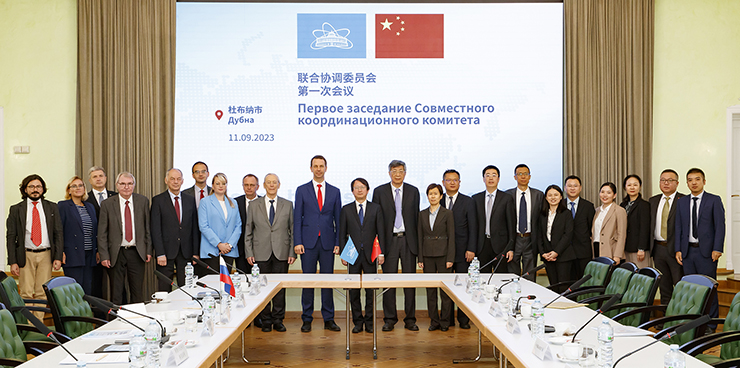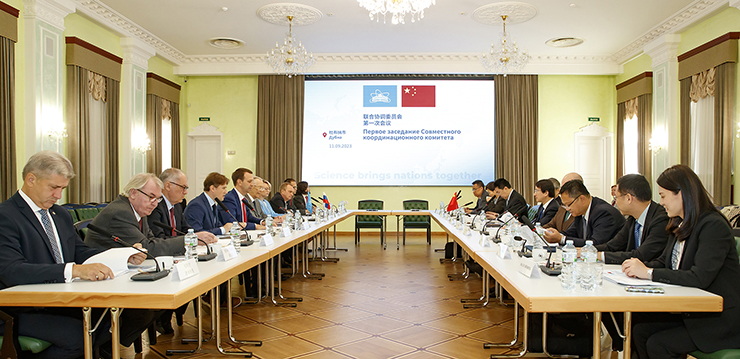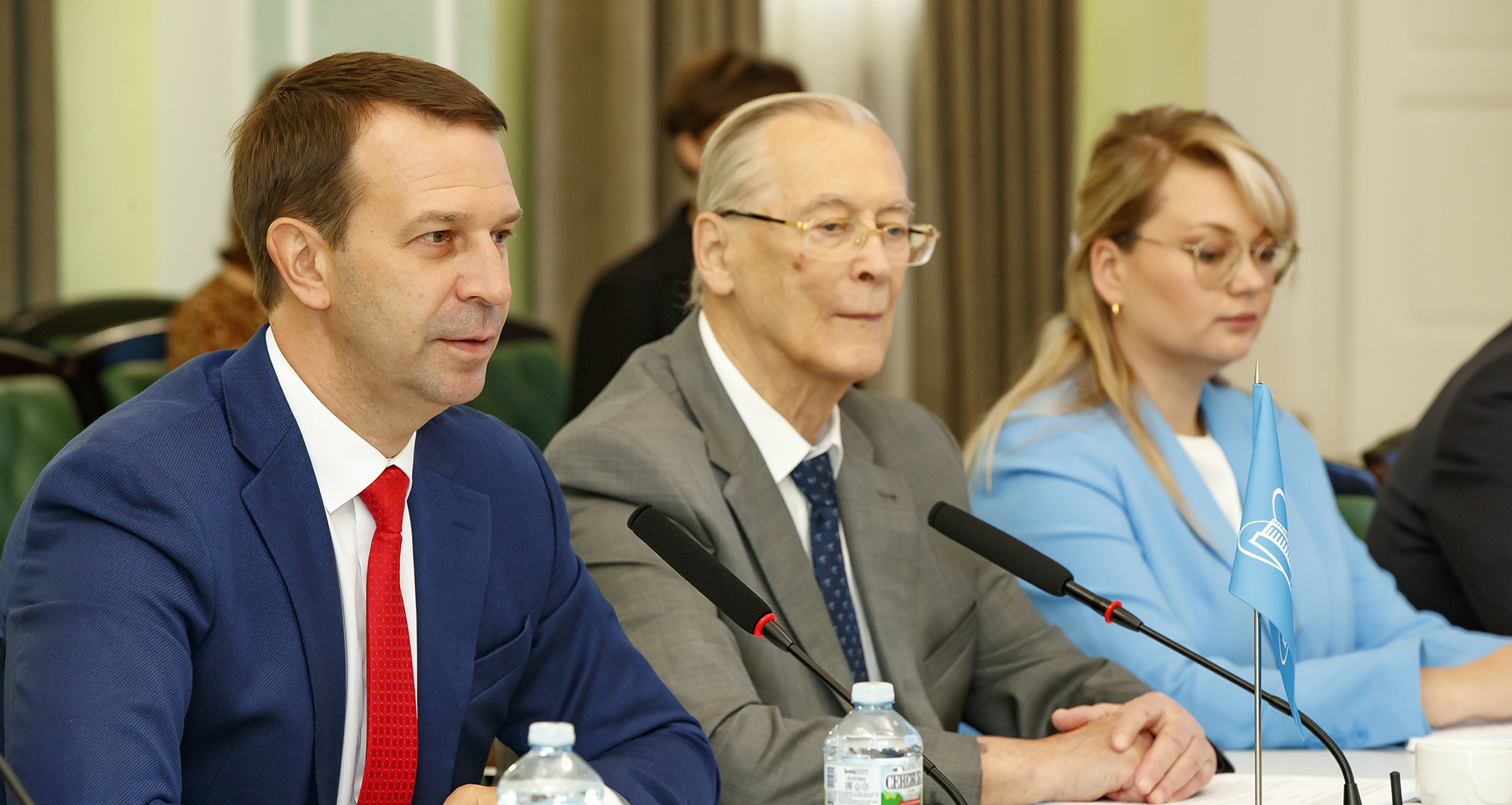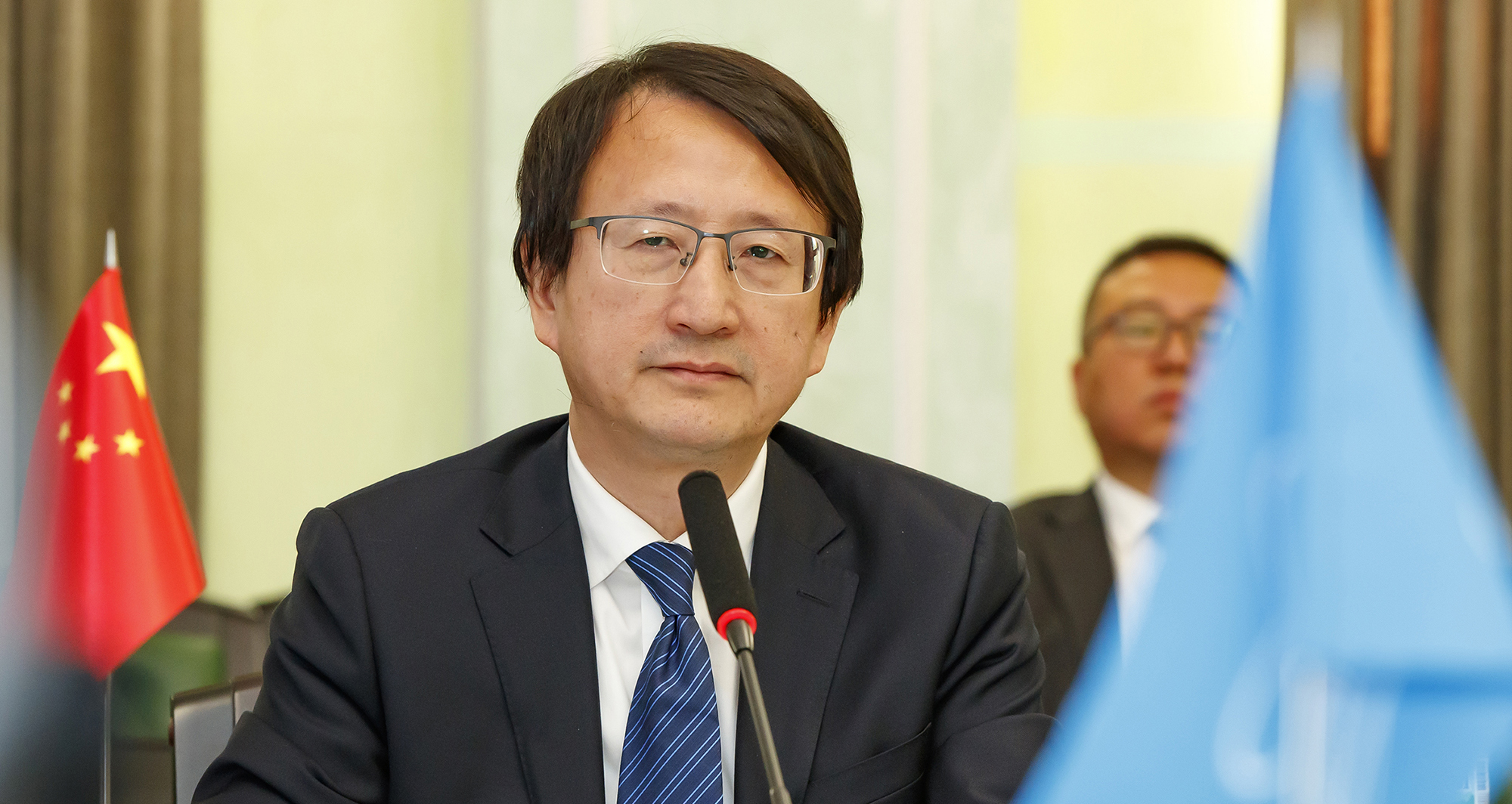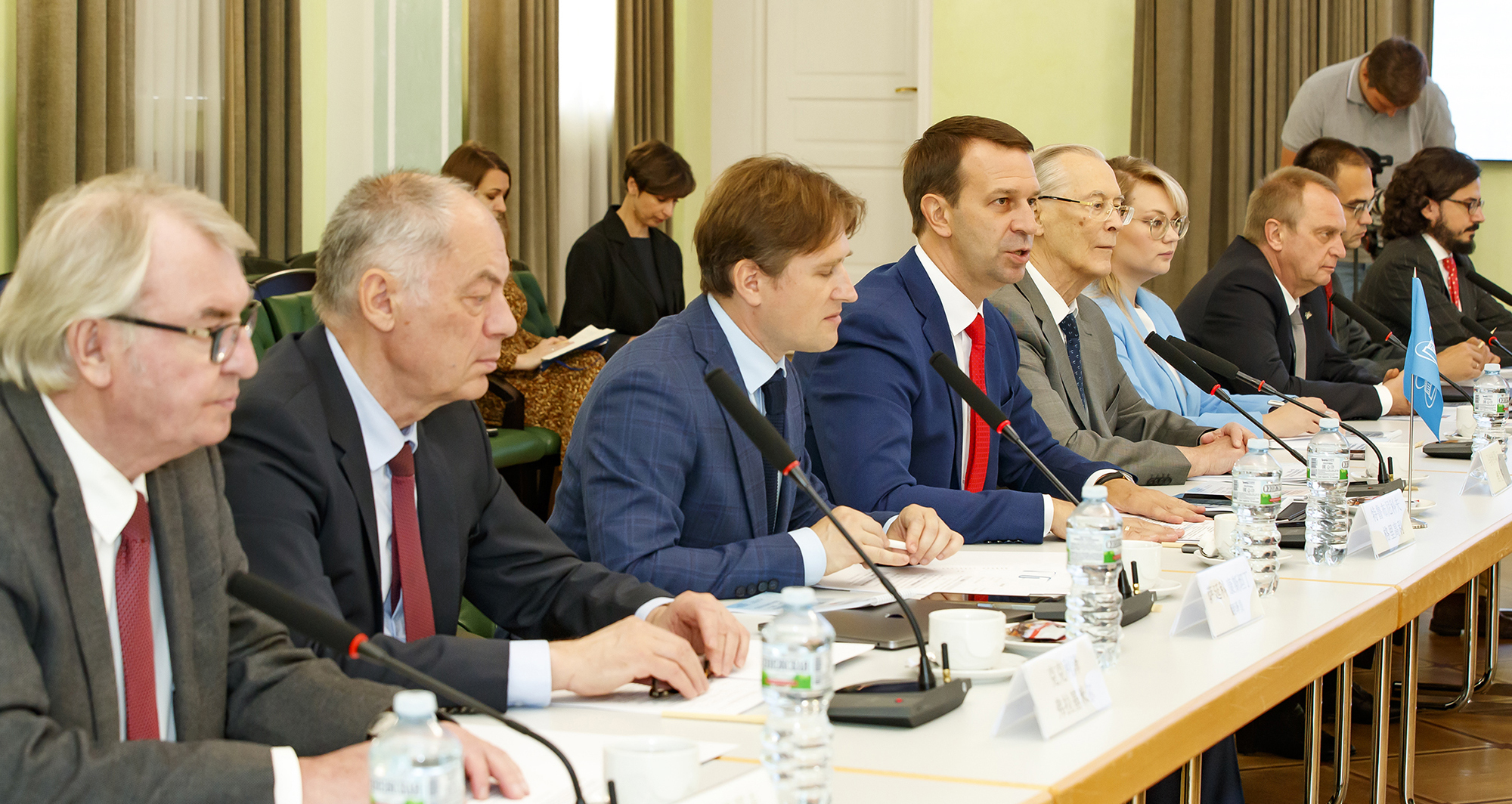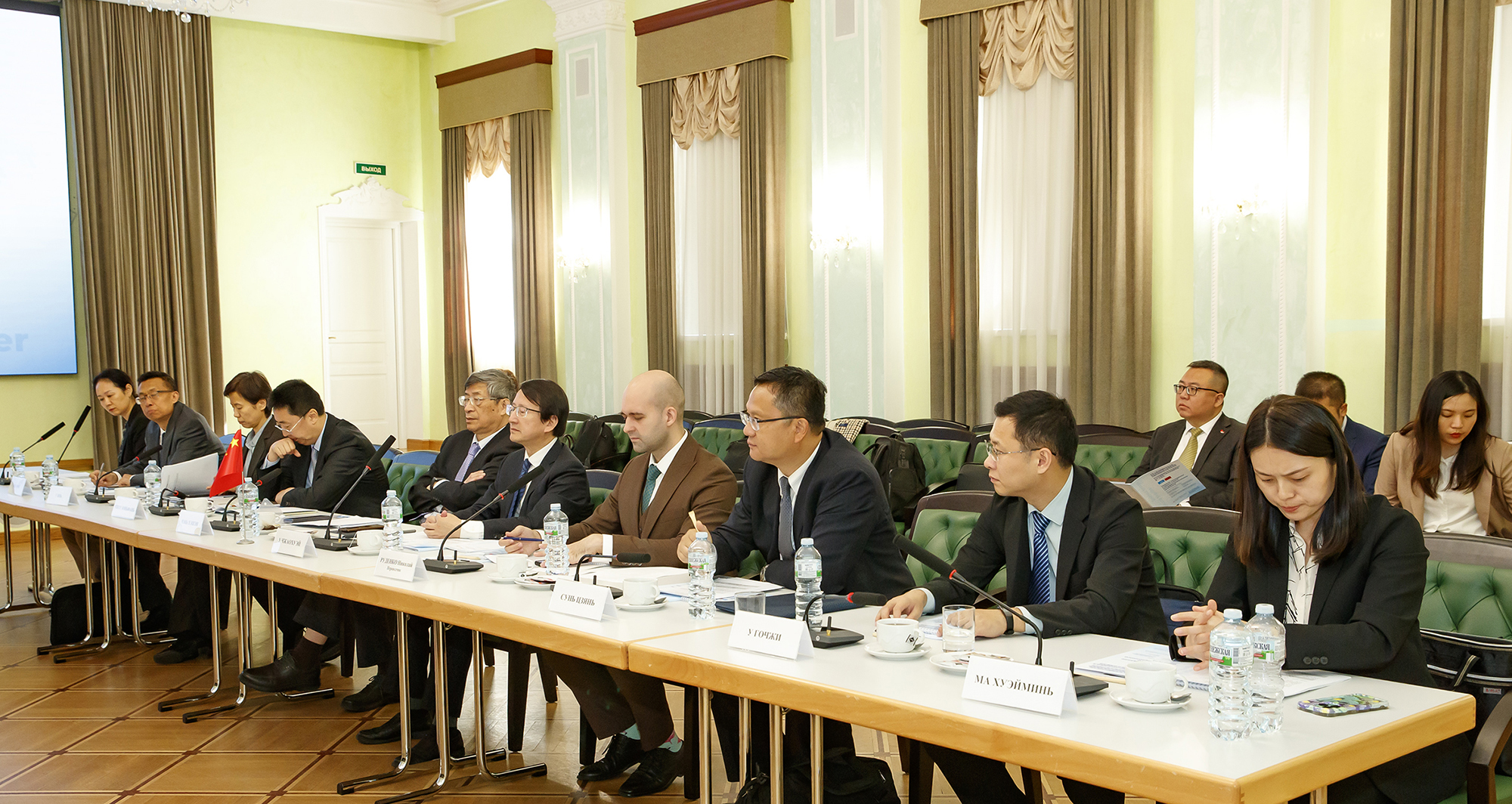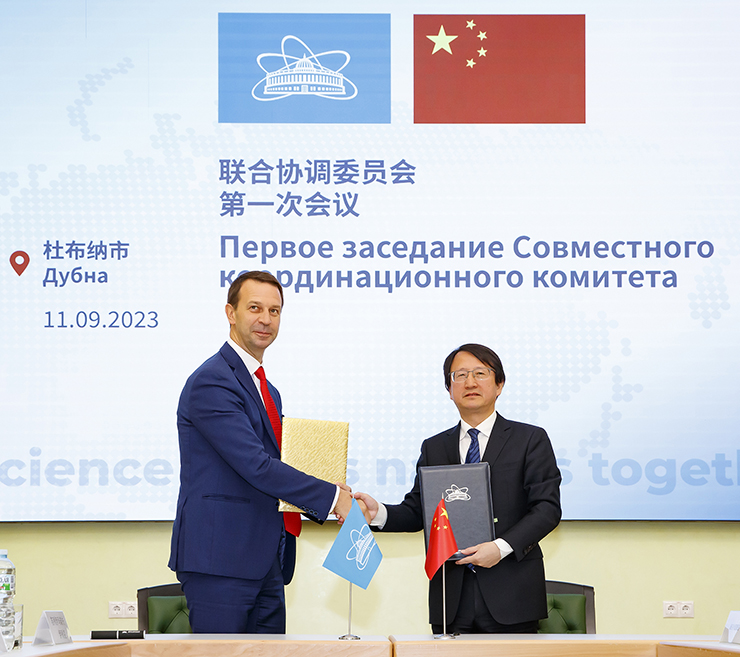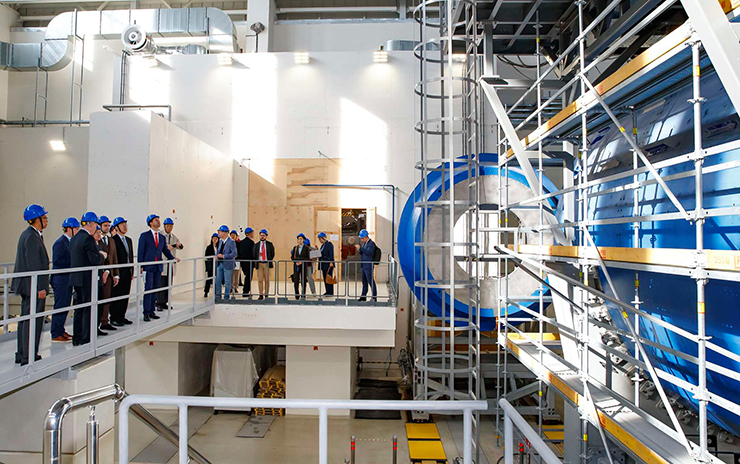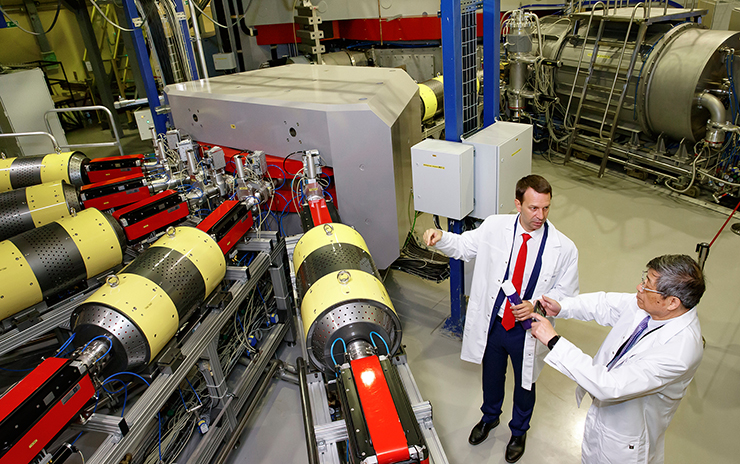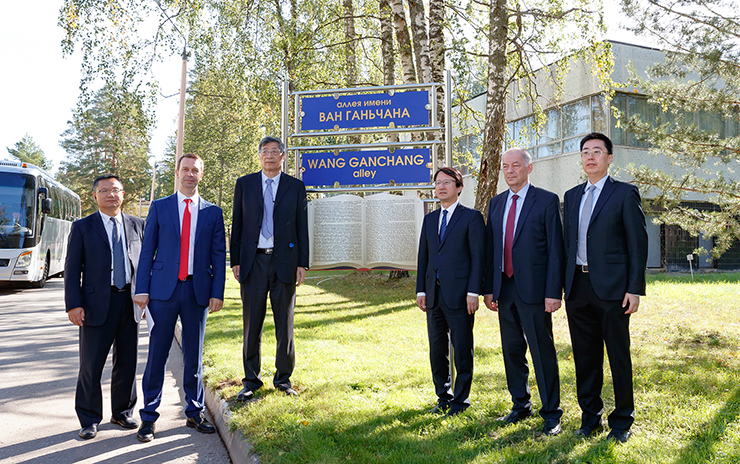“Moving forward confidently”: results of first meeting of PRC-JINR Joint Coordination Committee
News, 12 September 2023
On 11 September 2023, the first meeting of the Joint Coordination Committee took place under the Protocol between the Ministry of Science and Higher Education of Russia, the Ministry of Science and Technology of China, JINR, and the Chinese Academy of Sciences on strengthening cooperation in the field of basic scientific research. The event was held during the visit of the People’s Republic of China delegation headed by Vice Minister of Science and Technology of China, Academician Wu Zhaohui to the Joint Institute for Nuclear Research on 10 – 11 September 2023.
Before the meeting, the Chinese colleagues gained knowledge regarding the scientific infrastructure of JINR. They visited the Laboratory of High Energy Physics and the Laboratory of Nuclear Reactions. JINR Director, RAS Academician Grigory Trubnikov and Vice Minister of Science and Technology of the People’s Republic of China, CAS Academician Wu Zhaohui opened the first meeting of the Committee. The parties provided each other with information on the state of development of their fundamental research and discussed joint work on scientific projects of mutual interest. Special attention was paid to the academic mobility support programme.
“There is no need to say that the role of the People’s Republic of China in the history of JINR is fundamental. China was one of the founding states of the Institute, and this marked the right direction for the development of our international centre. Despite various turning points in history, we have never stopped working with Chinese scientists,” Grigory Trubnikov said during the opening. “I am very grateful to you for the fact that we have jointly formulated the main directions in which we will further develop and strengthen our cooperation. I am sure that today hundreds of scientists in China and Dubna have high hopes for the first meeting of the Joint Coordination Committee. They are waiting for our support, and we are ready to provide it.”
Grigory Trubnikov presented the achievements of the Institute to the Chinese colleagues, including implemented and planned major scientific projects and operating experimental facilities. “As part of the new Seven-Year Plan, we intend to commission the NICA Megascience Complex and start the work of international collaborations, increase the volume of the Baikal Neutrino Telescope to one cubic kilometre, put new experimental facilities of the Laboratory of Nuclear Reactions into operation, and actively run new innovative projects in the field of medicine and energy industry. Large-scale international research will be carried out at existing facilities, the Superheavy Elements Factory, the IBR-2 Reactor, the Govorun Supercomputer, and others”, Head of the Institute concluded.
In turn, Vice Minister of Science and Technology of the People’s Republic of China, Wu Zhaohui, spoke about the support provided to basic scientific research in China. He emphasised that China attaches great importance to basic science and noted that it is the only way to develop new technologies. Much attention is paid in China to the creation of a network of advanced laboratories in key areas of science and technology, the building of large experimental facilities, the training of scientific personnel, and the formation of research teams. Fundamental research is supported as part of a special ten-year plan. Investment in such research has increased from 50 billion yuan in 2012 to 195 billion yuan in 2022.
The co-leaders of the Expert Work Group (EWG) operating under the Committee, JINR Scientific Leader, RAS Academician Victor Matveev, and a researcher at the Institute of High Energy Physics of the Chinese Academy of Sciences, CAS Academician Chen Hesheng presented the results of the first EWG meeting held on 4 September to the PRC – JINR Joint Coordination Committee. The Work Group considered 18 projects proposed jointly by JINR and Chinese universities and research centres. All the projects were recognised as being of great scientific interest and importance for basic research in JINR and China. The parties discussed and approved the plan for the implementation and financing of joint projects recommended by the Expert Work Group. The Committee agreed that the parties would consult on the details of launching the first joint projects in the course of work.
The parties highlighted that the programme for the development of academic mobility that included scholarships for graduate students and researchers, exchange of both short-term and long-term visits, joint schools and scientific events would be very important in the near future. The Committee noted that it was necessary to involve a wider range of scientists engaged in related scientific fields from many organizations in its work to develop the cooperation more effectively. Academician Chen Hesheng particularly noted those great opportunities that were opened up thanks to the launch of new facilities in China, such as the synchrotron radiation facility in Shanghai and Hefei, the heavy ion research facility in Lanzhou, the accelerator neutron source in Dongguan. He also invited JINR scientists to prepare and organize joint experiments at those facilities.
The Committee highlighted the many-year successful and mutually beneficial cooperation between JINR and scientific and educational organizations of the People’s Republic of China as part of the preparation of the MPD and SPD experiments at the NICA Heavy Ion Collider being under construction now, as well as cooperation in the framework of the BESIII and JUNO experiments, the ones in the fields of heavy ion physics, neutron physics, R&D of medical accelerators, research in theoretical physics.” All these activities have created an excellent foundation that can be a springboard for the development of the next stage of our cooperation. So today, we are discussing the result of active work on the joint projects that specialists have carried out since the beginning of this year. After the signing of the Protocol on strengthening cooperation in the field of basic scientific research in March this year, a significant number of visits of JINR representatives to China took place. The work performed has already now allowed us to outline 18 joint projects with several dozen leading scientific organizations in China,” Grigory Trubnikov highlighted.
“It is only the first joint meeting of the Coordination Committee,” Wu Zhaohui, Vice Minister of Science and Technology of China, said. “However, we have already outlined many new directions for our future cooperation development. The Committee is a very important tool to advance on our common path, to implement the agreements that have been reached between us. Let us move forward confidently. We definitely have enough work for the next 2-3 years.”
At the end of the event, the parties signed the protocol of the first meeting of the PRC- JINR Joint Coordination Committee.
“I am glad to visit Dubna after 9 years. Previously, I visited it in 2014,” Academician Chen Hesheng said in his comment on the results of the meeting.”I believe that today’s meeting has become an important milestone for scientific cooperation between Dubna and Chinese institutions. I hope that we will soon start implementing joint projects important for both parties, and in the future we will create more collaborations and receive first-class scientific results.”
“We are close to the moment when we are about to turn a new page in the history of international cooperation. China stood at the very origins of the Institute’s foundation, and now we have brought our scientific interests and our desire to work together so close again that I have no doubt we will succeed. Implementing our joint programme together, we will come to results that will glorify both our science and our partnerships,” JINR Scientific Leader Victor Matveev highlighted, commenting on the results of the meeting.
On behalf of JINR, Vice Director of the Institute Vladimir Kekelidze, Vice Director of the Institute Sergey Dmitriev, JINR Chief Scientific Secretary Sergey Nedelko, his Deputy, Scientific Secretary of the Expert Work Group Alexey Zhemchugov, Director of the JINR University Centre Dmitry Kamanin, International Cooperation Advisor to JINR Director Irek Suleymanov, Deputy Head of the JINR International Cooperation Department Elena Badawy also participated in the event. A Chinese delegation included representatives of the Ministry of Science and Technology of China Zhou Yunfan, Sun Jian, Wu Guozhi, Ma Huimin, a representative of the Chinese Academy of Sciences Wu Yan, Science Advisor to the Chinese Embassy in Russia Miao Fei, First Secretary of the Embassy Yue Ping, and other employees of the Embassy. In addition, a representative of the Ministry of Science and Higher Education of Russia Evgenia Meshcheryakova joined the meeting.
